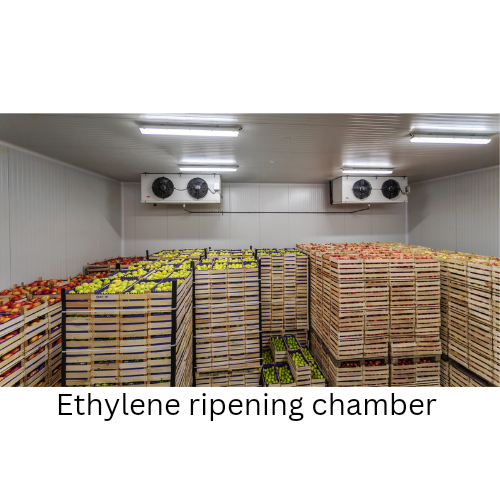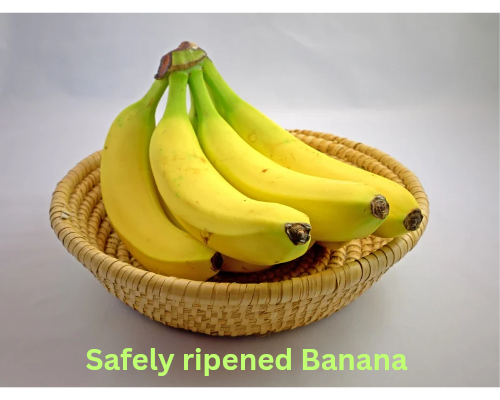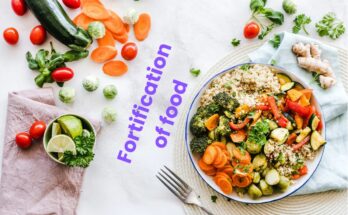Key Summary:
1. Use of carbide gas or acetylene gas is not permitted for artificial ripening of fruits under Food Safety and Standards Regulations, due to the potential health hazards.
2. Ethylene gas can be used for artificial ripening at a concentration up to 100 ppm (100µl/L).
3. Ethylene plays a vital role in natural ripening of fruits. It is a hormone produced naturally within the fruits to stimulate ripening process.
4. Ethylene, being a natural hormone does not pose any health hazard to consumers.
5. External application of ethylene gas generated from various sources such as ethylene gas cylinders, compressed ethylene gas, ethanol, ethephon, etc. can be used on fruits to trigger the ripening process in fruits.
6. Any source of ethylene gas coming in direct contact with fruits is not permitted.
7. Consumers should purchase fruits from known sellers/reputed stores/dealers who declare that fruits sold have not been ripened using harmful/banned chemicals.
A. What is fruit ripening:
Fruit ripening is a combination of physiological, biochemical, and molecular processes which lead to changes in colour, sugar content, acidity, texture, and aroma. In general, it is a physiological process which makes the fruit edible, palatable and nutritious. Fruits are classified into two categories according to the ripening pattern:
a. Climacteric fruits: These fruits are usually harvested once they have reached its full maturity and can be further ripened during transit or storage. These include banana, guava, avocado, mango, apple, pears, apricots, peach, tomato etc.
b. Non-climacteric fruits: These fruits do not ripen after harvest. Thus, in order to attain full ripeness and flavour, these fruits are often harvested once they have fully matured and ripened in the orchard. It includes fruits such as lemons, orange, grape, cherry, pineapple, strawberry etc.
B. Why artificial ripening is required:
Artificial ripening is the process by which ripening is controlled to achieve desired characteristics intended for better consumer acceptance and improving sales. It is generally done for climacteric fruits such as mango, papaya, banana, etc. to achieve faster and uniform ripening characteristics. Globally, artificially ripened fruits are considered as safe for human consumption if done using safe ripening agents. It facilitates the transportation of fruits like mango, banana, etc. which become soft and perishable after ripening. These fruits are transported to distant places in unripe condition to avoid loss and are artificially ripened at the destination market before sale.
C. Provisions for artificial ripening of fruits under food safety & standards regulations:
Artificial ripening of fruits by acetylene gas, commonly known as carbide gas, is prohibited as per the provision in sub regulation 2.3.5 of Food Safety and Standards (Prohibition and Restrictions on Sales) Regulation. It permits the use of ethylene gas at a concentration of up to 100 ppm (100µl/L) depending upon the crop, variety, and maturity for the artificial ripening of fruits.
D. Safe ripening using ethylene gas (C₂H₄):
Ethylene is a hormone naturally produced within the fruit and regulates fruit ripening by initiating and controlling a series of chemical and biochemical activities. The treatment of unripe fruits with ethylene gas triggers the natural ripening until the fruit itself starts producing ethylene in large quantities.

Natural fruit ripening process:
Fruits may be ripened naturally using the below mentioned methods within 4-6 days, if kept at room temperature These methods entrap ethylene around fruit and facilitates faster ripening.
1. Harvest the fruits at optimum maturity.
2. Wrap the fruits individually with paper or place it in paper bag.
3. Keep unripe fruits as layers over paddy husk or wheat straw.
4. Keep unripe fruits inside an air tight rice bin/container.
Critical factors to remember when purchasing or eating artificially ripened fruit:
1. Purchase fruits and vegetables from known sellers/reputed stores/dealers who claim that fruits are not ripened by using harmful/banned chemicals.
2. Wash fruits thoroughly with running potable water before eating.
3. Avoid fruits with black blotches on the skin as these fruits are likely to be ripened by acetylene gas produced from calcium carbide.




